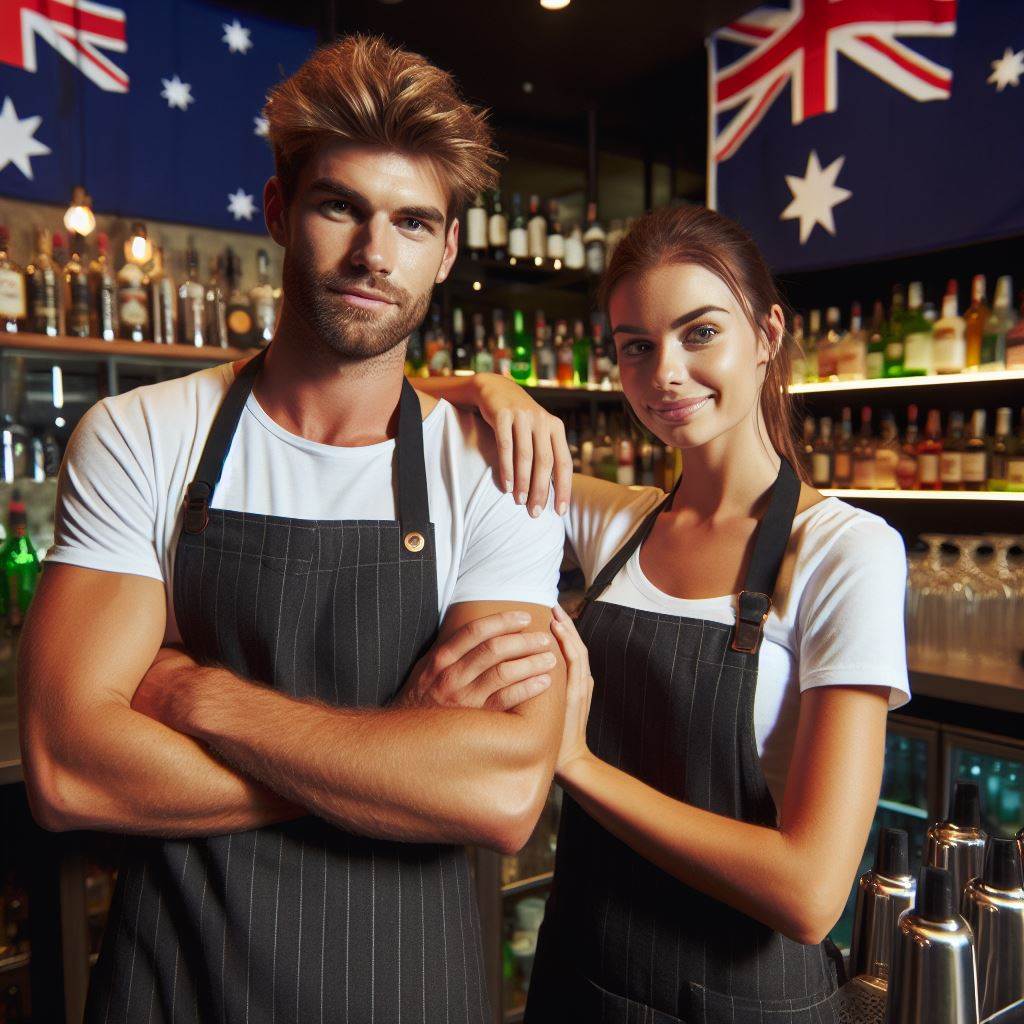Introduction
Australia’s liquor laws form a multifaceted framework that regulates the sale, service, and consumption of alcohol across the country’s diverse regions.
These laws encompass a wide range of regulations, from licensing requirements to responsible service practices, and they play a crucial role in shaping the operation of bars and pubs nationwide.
For bartenders in Australia, understanding and navigating these laws is not just a matter of compliance but a fundamental aspect of their profession.
From ensuring the responsible service of alcohol to managing licensing requirements and maintaining a safe and welcoming environment for patrons, bartenders bear a significant responsibility in upholding these regulations.
The purpose of this blog post is twofold.
Firstly, it aims to provide bartenders with a comprehensive overview of Australia’s liquor laws, delving into the key regulations that impact their daily operations behind the bar.
By shedding light on the intricacies of these laws, bartenders can gain a deeper understanding of their rights and responsibilities in serving alcohol.
Furthermore, this post seeks to underscore the importance of compliance with liquor laws in fostering a culture of responsible drinking and promoting the well-being of patrons.
By equipping bartenders with the knowledge and tools to navigate these regulations effectively, this blog post endeavors to empower them to uphold the highest standards of professionalism and service in their establishments.
This blog post aims to be a valuable resource for bartenders, exploring Australia’s liquor laws and their significance.
Through education and awareness, bartenders can play a pivotal role in fostering a safe, enjoyable, and responsible drinking environment for patrons across Australia.
Overview of Australia’s Liquor Laws
Legal Framework for Alcohol Sale and Consumption
Australia’s liquor laws are governed by a comprehensive legal framework designed to regulate the sale and consumption of alcohol.
Key Regulatory Bodies and Their Roles
- Australian Securities and Investments Commission (ASIC): Responsible for regulating the financial aspects of liquor licenses.
- Australian Competition and Consumer Commission (ACCC): Focuses on competition issues within the alcohol industry.
- Australian Taxation Office (ATO): Ensures proper taxation and payment of alcohol-related duties.
Types of Liquor Licenses and Requirements
- General Liquor License: Allows for the sale of alcohol to the public at a specific premises.
- On-Premises Liquor License: Permits the sale and consumption of alcohol on the premises where it is sold, such as bars and restaurants.
- Off-Premises Liquor License: Authorizes the sale of alcohol for consumption off the premises, such as bottle shops and supermarkets.
- Special Event Liquor License: Required for temporary events where alcohol is sold or supplied to the public.
Overview of Responsible Service of Alcohol (RSA) Requirements
- Mandatory RSA Training: All staff involved in the sale or service of alcohol must complete an RSA training course.
- Age Verification: It is crucial to ask for valid identification to ensure customers are of legal drinking age.
- Intoxication Management: Staff should be trained to identify signs of intoxication and assess the customer’s level of impairment.
- Refusal of Service: Bartenders have the right to refuse service to individuals who appear intoxicated or underage.
- Responsible Promotion: Advertising and promotional activities should promote responsible consumption of alcohol.
Understanding Australia’s liquor laws is essential for bartenders to navigate the industry responsibly. The legal framework, regulatory bodies, types of licenses, and RSA requirements play a crucial role in ensuring the safe sale and consumption of alcohol.
By adhering to these laws, bartenders can contribute to a safer and healthier drinking environment.
Read: Top 10 Destinations Aussie Agents Love
Compliance Requirements for Bartenders
As a bartender in Australia, it is crucial to comply with the country’s liquor laws and regulations. Failure to do so can result in severe consequences such as fines, license suspensions, or even imprisonment.
Mandatory RSA Certification
RSA Training and Certification Process
Before working as a bartender, individuals are required to complete Responsible Service of Alcohol (RSA) training. This training equips them with the necessary knowledge and skills to serve alcohol responsibly.
Importance of Having a Valid RSA Certificate as a Bartender
Having a valid RSA certificate is not only a legal requirement but also demonstrates a bartender’s understanding of responsible alcohol service. It provides assurance to employers and customers that they can trust them to serve alcohol safely and responsibly.
Understanding Age Restrictions for Serving Alcohol
Legal Age for Serving Alcohol in Australia
In Australia, the legal age for serving alcohol is 18 years old. Bartenders must ensure that they do not serve alcoholic beverages to individuals below this age limit.
Identification Requirements for Verifying Customer Age
Bartenders are responsible for verifying the age of customers who appear to be under 25 years old. Acceptable forms of identification include driver’s licenses, passports, or proof-of-age cards. It is essential to check IDs to prevent underage drinking.
Knowledge of Prohibited Practices and Responsible Service Obligations
Prohibition of Serving Intoxicated Individuals
Bartenders must never serve alcohol to individuals who are visibly intoxicated. It is their responsibility to refuse service and potentially intervene if necessary to prevent harm to both the intoxicated person and others.
Responsible Consumption Practices
Bartenders play a vital role in promoting responsible alcohol consumption. They should encourage patrons to pace their drinking, offer alternatives to alcohol, and monitor individuals’ alcohol intake to prevent excessive consumption.
Dealing with Challenging Situations
As a bartender, there may be situations where customers become aggressive or difficult due to intoxication. Bartenders should be trained in conflict resolution techniques, such as de-escalation strategies, to peacefully handle such situations and ensure the safety of all patrons.
Staying compliant with liquor laws and regulations is not only a legal obligation but also a matter of public safety.
Bartenders who understand and adhere to these compliance requirements contribute to a responsible drinking culture and help create a safe and enjoyable environment for all customers.
Read: The Impact of Social Media on Travel Agents
Licensing and Permits for Bartenders
In order to legally serve liquor as a bartender in Australia, it is important to understand the different liquor licenses and permits that are applicable to your profession. This section will provide an overview of the various licenses and the process for obtaining them.
Your Personalized Career Strategy
Unlock your potential with tailored career consulting. Get clear, actionable steps designed for your success. Start now!
Get StartedOverview of different liquor licenses applicable to bartenders:
- On-premises license: This license allows bartenders to serve alcohol on the premises of a licensed establishment such as bars, restaurants, or hotels. It is the most common type of license for bartenders.
- Off-premises license: Unlike the on-premises license, this license allows bartenders to sell alcohol for consumption off the premises. It is required for bartenders working in bottle shops or other retail establishments.
- Other specialized licenses: In addition to the on-premises and off-premises licenses, bartenders may need specialized licenses for specific events or situations. Examples include limited licenses for events like festivals or temporary licenses for pop-up bars.
Application process for obtaining a liquor license
- Required documentation and forms: Bartenders complete application forms and provide identification, training proof, and character references. States may have specific requirements.
- Fees and timeline for license approval: There are fees associated with applying for a liquor license, and these can vary depending on the type of license and jurisdiction. The approval process may take several weeks or months, so it is advisable to submit the application well in advance.
- Additional considerations for certain licenses: Some licenses may need extra steps, like background checks or public notices, before approval. Bartenders should stay informed and comply with regulations.
By understanding the different licenses and following the application process, bartenders can navigate Australia’s liquor laws and ensure they are legally permitted to serve alcohol.
It is important to stay informed about any updates or changes to the licensing requirements in order to maintain compliance and provide a safe and responsible environment for patrons.
In essence, licensing and permits play a vital role in the bartending profession. Bartenders must familiarize themselves with the various licenses applicable to their job and follow the application process diligently.
By doing so, they contribute to the responsible and legal serving of alcohol in Australia.
Read: The Role of Tech in Modern Travel Agencies

You Might Also Like: Aussie Guide Tales: Unforgettable Moments
Penalties and Consequences of Non-Compliance
Overview of potential penalties for breaching liquor laws
- Fines and monetary penalties: Individuals and businesses may face hefty fines for non-compliance.
- License suspension or cancellation: Authorities have the power to suspend or cancel liquor licenses.
- Criminal charges for serious offenses: Severe violations can result in criminal charges and legal consequences.
Importance of adhering to liquor laws and maintaining a good professional reputation
Compliance with liquor laws is crucial for bartenders to uphold their professional reputation and avoid legal ramifications.
By following the rules and regulations, bartenders can ensure a safe and responsible environment for both customers and themselves.
Violating liquor laws not only leads to legal penalties but can also damage the reputation of the establishment and the bartender.
Customers value responsible service practices and have higher trust in establishments that prioritize their safety. Maintaining a good professional reputation by adhering to liquor laws can enhance the bartender’s career prospects and job opportunities.
Responsible service practices within the industry
It is not just the responsibility of individual bartenders to navigate liquor laws, but the industry as a whole.
Establishments and industry organizations must actively promote and enforce responsible service practices.
By offering training programs and resources, the industry can equip bartenders with the knowledge and skills to comply with liquor laws.
These measures can help prevent violations and reduce the occurrence of alcohol-related incidents, contributing to a safer environment.
Furthermore, fostering a culture of responsible service practices within the industry improves its overall reputation.
This positive image will attract more customers and create a sustainable business environment.
In summary, understanding the potential penalties and consequences of non-compliance with liquor laws is essential for bartenders.
By adhering to these laws, bartenders can maintain their professional reputation, avoid legal troubles, and create a safer and more responsible industry.
Read: Navigating COVID-19: Travel Agents’ Advice
Conclusion
Recap of key points: Bartenders, the frontline custodians of alcohol service, bear a responsibility to comprehend Australia’s intricate liquor laws.
From stipulated serving hours to the nuances of responsible service obligations, the legal landscape demands diligence.
Importance of understanding Compliance transcends a mere checkbox; it’s the linchpin that safeguards patrons, ensures the legality of the venue, and fortifies the trajectory of a bartender’s career.
Beyond avoiding legal ramifications, a deep understanding fosters a culture of responsible alcohol consumption.
Encouragement to stay updated In the ever-evolving legislative landscape, static knowledge is a liability.
The proactive bartender acknowledges the dynamic nature of laws, remaining vigilant for any amendments or updates.
Continuous education is not just a recommendation; it’s an imperative step towards sustained professionalism and an unwavering commitment to legal and ethical standards in the art of mixology.




